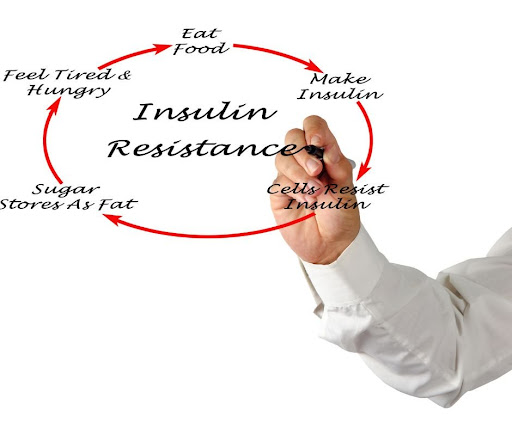Up to 40% of young adults in the U.S. have insulin resistance, which occurs with many cardiometabolic risk factors (1). Insulin resistance is a complex condition in which the cells in the human body, particularly in fat, liver, and muscles, do not respond to the hormone insulin as usual and fail to regulate blood sugar levels. Body cells respond inappropriately to insulin and cannot easily take up the glucose from the blood. This process elevates the blood sugar levels leading to prediabetes and then diabetes.
Causes and risk factors of insulin resistance
Many factors cause insulin resistance, including:
- Obesity
- Sedentary lifestyle
- Overeating
- High fructose intake
- Disruption in the gut microbiome
- Age
- Family history of type-2 diabetes
- Inflammation
- Polycystic Ovary Syndrome
- Gestational diabetes
- Smoking
- Non-alcoholic fatty liver disease
- Ethnicity
- Some medications
Symptoms of insulin resistance
As long as your pancreas increases insulin production to maintain your blood glucose levels, you may not develop obvious symptoms of insulin resistance. However, this condition gets worse with time.
High insulin and sometimes high blood sugar levels are the primary signs of insulin resistance. To get diagnosed, you will need a fasting blood test.
Some people with insulin resistance develop acanthosis nigricans, a condition that involves darkening of the armpits, back, and neck. Study suggests that some people experience early eye changes, leading to retinopathy (2).
Some important signs of insulin resistance are:
- Sugar cravings
- Fatigue
- Carrying body fat in the waist — the size of 35 inches or more for women, 40 or more for men
- Fasting blood sugar levels in the prediabetes range (100 to 125 mg/dl)
- High blood pressure readings
- Fasting triglyceride levels over 150 mg/dL
- HDL levels below 50 for women and 40 for men
Complications of Insulin Resistance
In most cases, when insulin resistance is left untreated, it can lead to long-term health problems such as diabetes.
Other complications of insulin resistance (and diabetes) are:
- Heart problems
- Stroke
- Eye diseases
- Kidney Failure
What Can I Do to Prevent or Reverse Insulin Resistance?
The first thing you should do to prevent or reverse insulin resistance is, learn more about the connection between diet and the condition. Also, insulin resistance and weight loss are inversely proportional to each other. Eating a healthier, balanced diet and increasing physical activity can help reverse insulin resistance. According to the Diabetes Prevention Program, losing up to 7 percent of your body weight can help you reduce the chances of developing diabetes (3).
The other treatment option for insulin resistance is taking medications. Your doctor may prescribe metformin. However, studies found that medicines such as GLP-1 agonists are superior in managing insulin resistance. At WeightCare Anywhere we often prescribe GLP-1 agonists Semaglutide and Tirzepatide, the two leading medications in the market for diabetes. These medications mimic the action of GLP-1, a hormone that leads to insulin secretion and lowering of sugar (glucagon) secretion from the human liver. These actions ultimately help maintain blood glucose levels within range.
Side effects of these medications cause people to feel fuller faster and have a decreased appetite overall. They are an important tool in a person’s healthcare “toolbox” to help them combat insulin resistance and weight concerns!
To prevent or reverse insulin resistance, have a plan and make some lifestyle changes. Track your progress and seek regular professional help.
Trust the weight loss professionals at WeightCare Anywhere today! We offer affordable weight management plans with Semaglutide and Tirzepatide and look forward to helping you live a healthier, happier life. We offer the most affordable, accessible, sustainable weight loss care in Ohio, Colorado, New York, Texas, Illinois, Arizona, and Washington!

